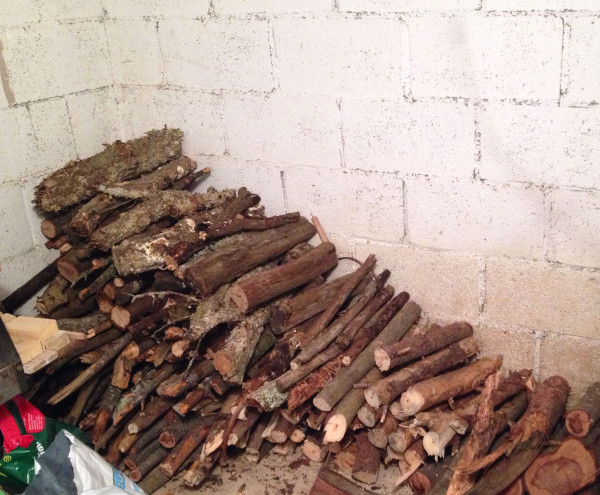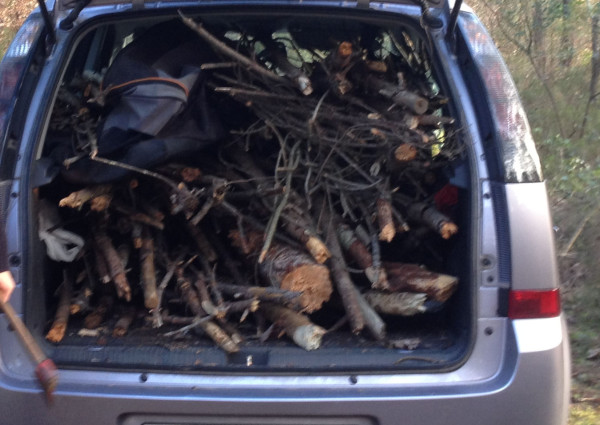While many people associate the Costa Brava with yearlong sunshine, the truth is that it can get bitterly cold in the winter, and some kind of heating is essential.

During our first winter after moving to the Costa Brava we invited a few people over one Sunday afternoon to discuss a joint project in which we were all working, and given the drop in temperature I decided to get the fire going just as the first car arrived.
With the fire going slowly, once the last member of our little party had arrived we offered coffee, tea and biscuits, but after emerging from the kitchen while attending to the espresso machine and boiling kettles found that all three of our guests were out on the terrace in the cold; while in the kitchen the living room had filled with smoke, which was rolling out from the top of the fireplace into the living room in a thick fog.
Grabbing a torch and peering through the gloom I could see that the vent flap inside the chimneybreast, designed to prevent draughts coming down through the chimney, was closed. Somehow, since our last fire, the lever had turned slightly, and while not fully sealed it was preventing most of the smoke from exiting through the chimney.
Turning the lever had no effect, so I grabbing the poker and prodded the flap open. With all doors and windows open the room slowly cleared and after a bit of delay we sat down for our meeting; of course, when talking about it later, we both denied responsibility for closing the flap.
The pros and cons of an open fire
When we were looking for a house one of my essentials was an open fire, as I’ve always loved the one in my parents’ house both for the warmth it provides and the sense of comfort it brings to the gloom of those short winter days. While many people associate the Costa Brava with yearlong sunshine, the truth is that it can get bitterly cold in the winter, and some kind of heating is essential.
In addition to the fireplace, which although it does provide a lot of warmth takes time to heat the house adequately, we have oil heating. While efficient, it can be brutal on the wallet though, and so whenever we can use the fire, we do.
While it is used frequently, it is hard work too. Although you can buy firewood, you get through it at such an alarming rate that you really need to go and gather your own from the forest; and with an almost infinite supply of fallen branches it would be a waste to simply let it rot. So, once a week we aim to go wooding although with other bits of life getting in the way it doesn’t always happen.

An hour in the forest provides quite an amount of wood, and another half hour at home with the chainsaw sees to it that the wood is cut into manageable logs and stacked to dry out. However, soon after each time I think the woodpile is getting to be a good size, it has dwindled again and so wooding is a never-ending task. It is not just through burning that firewood provides heat though, as you soon get warm from collecting and cutting wood too.
You can buy wood too, of course. Many supermarkets sell bundles of firewood, and petrol stations do too. However, whenever we look at the amount you get for you money and consider how much wood we burn it just doesn’t make sense.
Oil heating is like burning money
Heating oil is obtained easily, but it is very expensive. Just call the oil company and within a day or so you’ll have another full tank. However, our oil tank holds a thousand litres and at 90 or 95 cents per litre that all adds up.
It does last for nine months or so though, but most of the oil is consumed in the two or three weeks when the real cold hits, with it just being used to provide hot water for the remainder of the year.
It is really alarming to see how it goes down when were using the central heating and I’ve learnt to turn the thermostat down by a couple of degrees and wear more layers at home. You soon acclimatise and if I’m feeling particularly cold I can always go and chop some wood!
Bottled gas versus piped gas
Another common solution to heating homes is using portable gas heaters. Butane cylinders are widely available from petrol stations and elsewhere, but you need to have an empty bottle to exchange for a fresh one. Officially you should have a contract with the supplier, but in reality people often inherit gas bottles when they purchase a property or are simply given them; it doesn’t seem to matter at all.
One of the big drawbacks is that some people suffer headaches from the fumes produced by the burning gas, which obviously isn’t ideal anyway. And they are relatively slow and inefficient anyway.
Some areas have town gas piped into the home, which is far more convenient and allows the central heating system to be gas powered. This is relatively new on the Costa Brava but the gas network is gradually expanding. For this you’ll need to pay the costs of installing gas into your property, as well as a new gas boiler and the work required to plumb it in to your new central heating system, if you have one, or the installation of plumbing and radiators if you don’t. This will add up to several thousand euros, but the long term benefits are that your heating will be more efficient, cheaper, and you’ll never have to replace an empty gas bottle when you least need to.
Heating your home with electricity
Of course electric heating is also an option; electric bar heaters, hot air blowers and oil filled radiators all have their uses. Of these the first two tend to provide a rather localised source of heat, while the oil filled electric radiators seem to be much more efficient at heating a room.
The main drawback, like oil, is that the costs quickly mount up and you’ll really notice the effect of the heating on your next electricity bill. However, there is something else to bear in mind; in 2010 there was a heavy snowfall that resulted in the collapse of many electricity pylons and thousands of homes were without electricity of several days.
If electricity provides your only source of heat and similar conditions reoccur then you may find yourself freezing for a few days and unable to even make a hot drink; remember that a boiler fuelled by oil or gas also needs mains electricity to function, so that will get knocked out too if supply is disrupted.
What type of heating is best for you?
All heating options have their pros and cons and there is no one solution for everyone. An open fire plus and oil fired boiler work well for us, but with a lot of time and effort to fuel the former, while the latter costs a lot, but your location will to an extent determine what options are best for you, as will the amount of time you spend in your property during the winter; if you own a holiday home and only use it for a couple of weeks during the winter then an oil filled electric radiator would be my suggestion, although you need balance the cost of purchase against running costs and your own comfort. And if you your holiday home has an open fire – many do – then make sure you have at least a small supply of wood in the case that a heavy snowfall means you are without power, as happens every quarter century or so.


1 Comment
Thank you for your help I am thinking of moving to Spain and thought of what I have been hearing in regards to heating our home and the best option